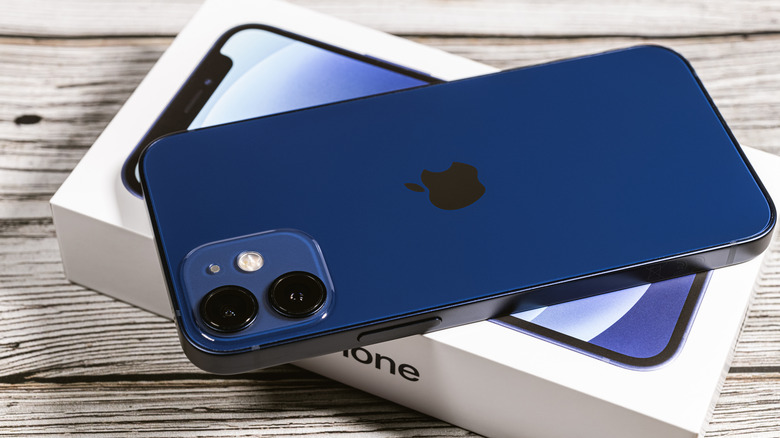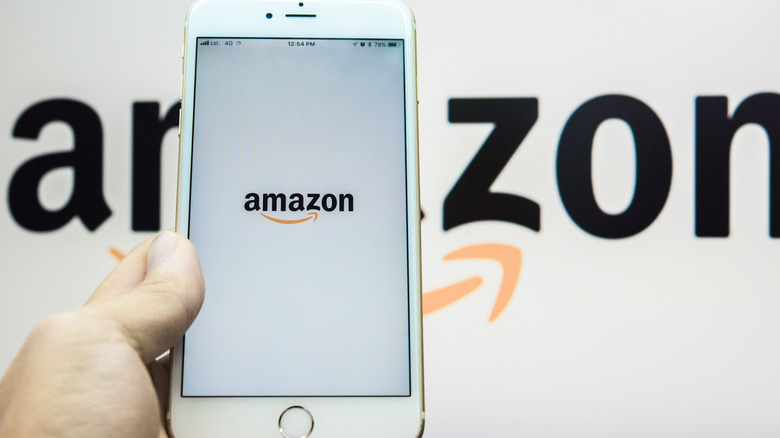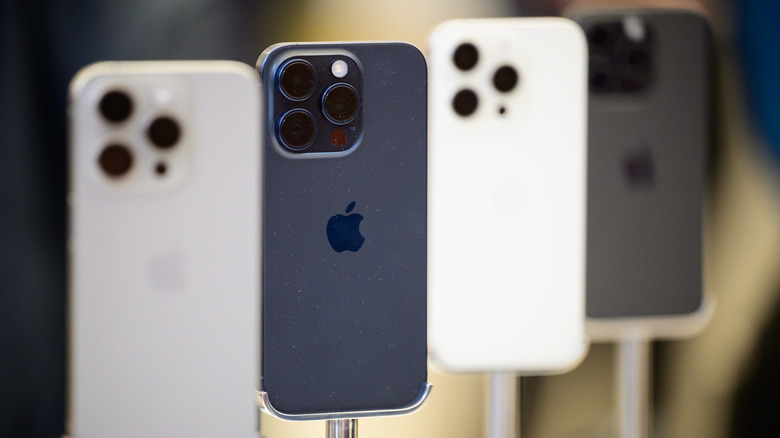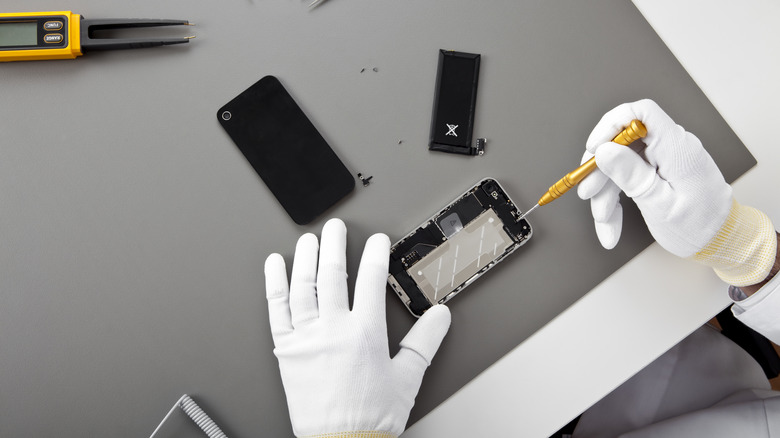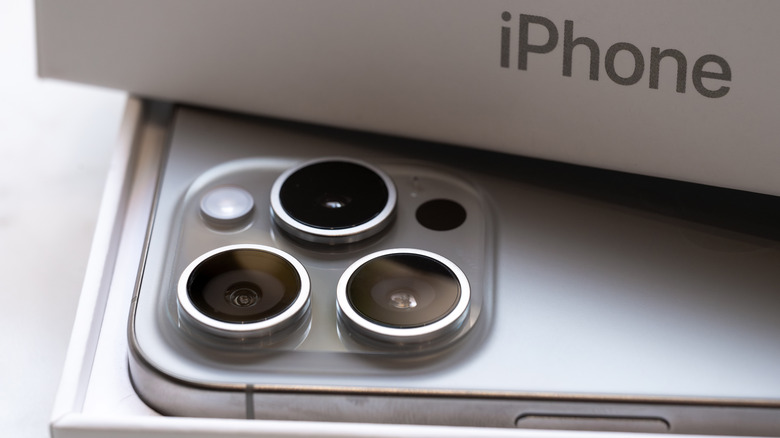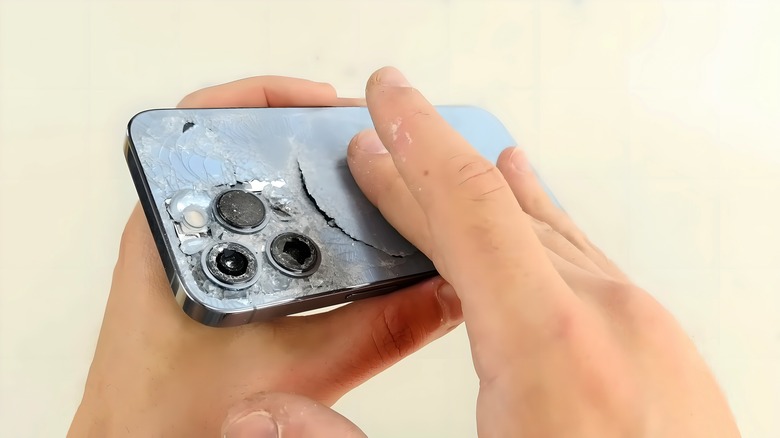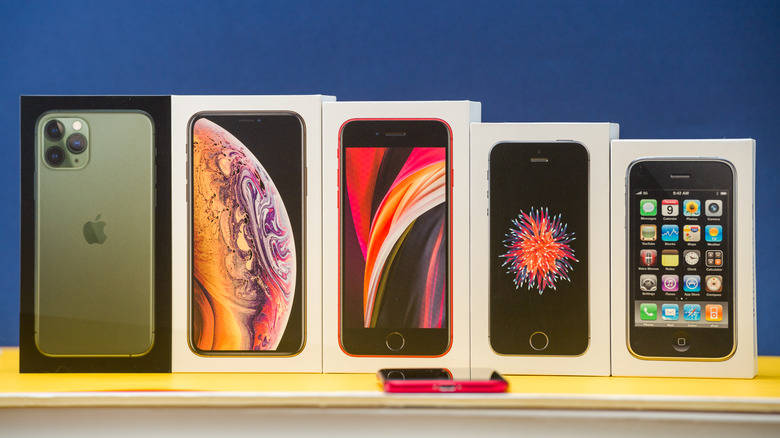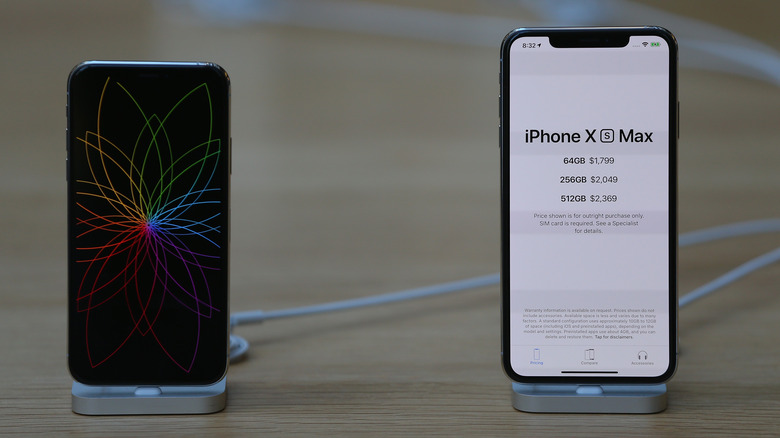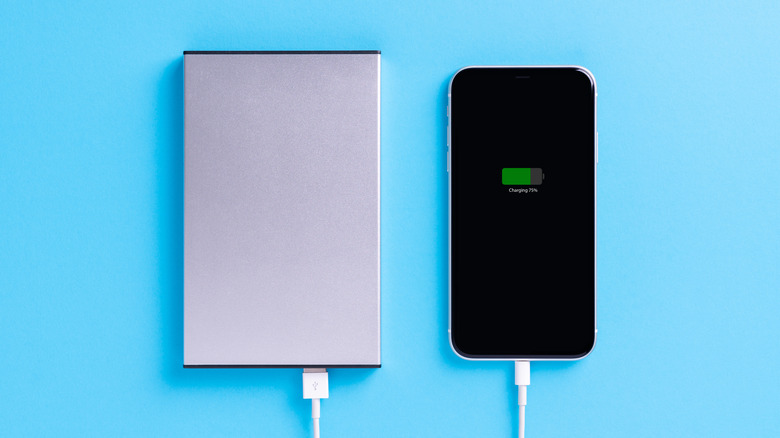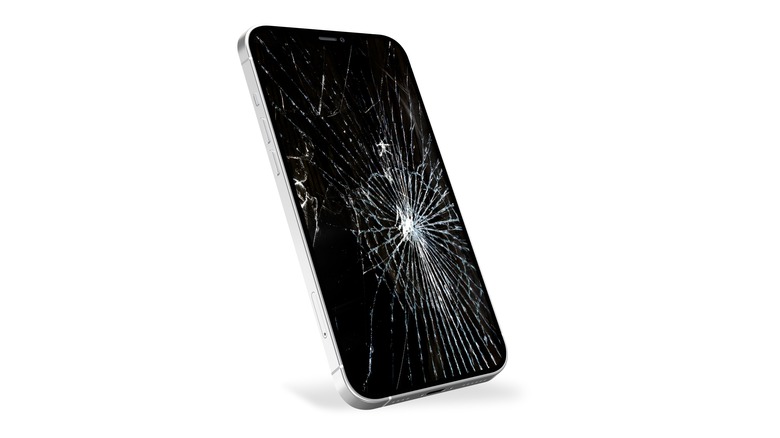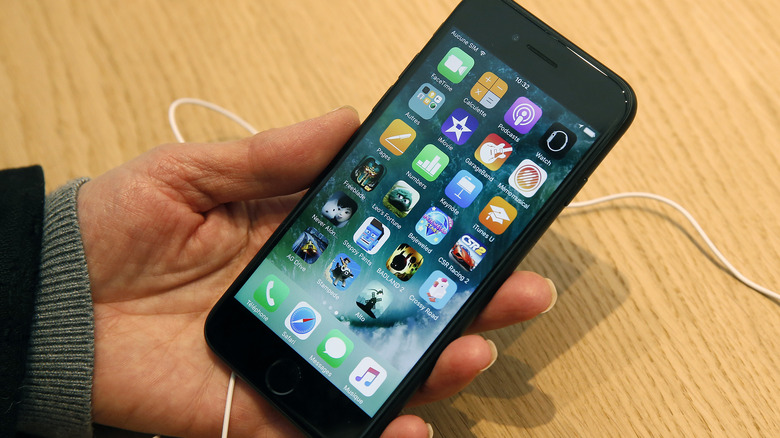10 Things To Consider Before Buying A Renewed iPhone
Owning a smartphone has become essential to daily life. It offers consumers the ability to go anywhere while still being able to take pictures, browse the internet, and complete important work. Unfortunately, one of the greatest barriers preventing people from getting a new phone is cost. This is especially the case with Apple's iPhones, as even their cheapest offerings are still above $400. Luckily, there's still one way for buyers to try out the company's phones at a relatively affordable price.
Renewed iPhones — also called refurbished iPhones — are a step above the usual used fare. While these phones usually had previous owners, they've been tested and cleaned by sellers, ensuring there won't be any major faults or damage. While the experience might not exactly match that of brand-new phones, the sacrifices are relatively minor when considering the vastly reduced costs. It makes for a fantastic middle ground between buying a brand-new smartphone and getting a used one at a cheaper price.
Despite the positives, there are still some risks to be aware of before buying a renewed iPhone. Some of the risks apply just as well to new and used phones, while others might be a bit more unique to refurbished items.
Reputable sellers
Though Apple boasts a selection of refurbished iPhones on its own website, the selection is fairly limited. Buyers are more likely to find the phone they're looking for on places like Amazon or eBay. Unfortunately, this comes with one of the greatest risks one can find when buying a renewed phone, as well as a new or used one. On these websites, a vast majority of renewed items are provided under third-party sellers. While this isn't always a problem, a few of these sellers can turn out to be less reputable than others, possibly leading to headaches, long shipping times, and even outright scams.
Consumers should always be aware of who they're buying renewed phones from. Checking reviews of the seller is just as important as checking reviews of the phone itself. Sometimes there will be completely new sellers listing their own renewed phones, leaving it up to the buyer to risk everything on their purchase. It's better to buy from sellers with a great reputation, especially if they offer their own return policies or support. More official sources like Apple themselves will always be more trustworthy, but if those official sources are lacking a certain phone, treading carefully with other sellers is the only way to go.
Model and features
While there might be nothing faulty or broken about an iPhone sold by a third party, the device itself might not be what the consumer is expecting. Some renewed phones might lack information on what features are provided or what apps are already supposed to be on the device. In some cases, buyers might even receive an entirely wrong model of iPhone, such as a 12 instead of an 11 or a regular model instead of a Pro. This issue is far less likely to occur with renewed items than with standard used phones, but it's still something to be wary of.
If you are skeptical about a particular listing, it can help to look at every aspect of the iPhone's description. A simple quantifier like storage size can be of great help in determining a phone's model, as regular models usually have lower minimum gigabyte amounts than Pro models. For instance, you are unlikely to find an iPhone 12 Pro with a size of only 64 GB. Using knowledge about what each iPhone should offer will give a great understanding towards how accurate a certain seller's listing is, as well as whether that seller can be trusted with providing renewed phones in the first place.
Service window
Even if a renewed iPhone works perfectly out of the box, it can still develop issues later. When this happens, it's important to find a good way to service these phones, but a simple DIY solution might not always be feasible. Apple products are notoriously difficult to repair at home, so the easiest way to get an iPhone up and running again is to get direct assistance from the company itself. Unfortunately, for certain renewed phones, this might not even be an option.
Typically, renewed phones are devices first released years ago. Apple's policy on these older devices only guarantees service and parts until five years after the phone's initial release date, although they may extend this if parts remain available. After seven years, however, the company officially stops providing that support, leaving older phones in the dust entirely. For instance, the iPhone 12 was released on October 16, 2020. This means that the phone's guaranteed support will last through 2025, with the possibility of limited support lasting until 2027.
There are still ways consumers can attempt to repair their iPhone without Apple's help, but those methods may not resolve critical issues. As such, it's better to go for relatively up-to-date refurbished models, especially as technology continues to evolve.
Software compatibility
Some older phones might also lack up-to-date features and software. While software at least usually benefits from support across a much longer term, some phones can still end up falling behind. The iOS system standard in all iPhones has varying levels of support. iOS 17, the version released at the end of 2023, only supports devices as old as the iPhone XR or 2nd generation SE. As of 2024, that translates to around six years of support, and that support is unlikely to continue to the next iOS version.
Even if a renewed iPhone already comes with older software, it can still be worthwhile to check compatibility. This will make it easy to see if software updates will keep things running for a while longer, allowing new applications to run just fine on an older device. However, there are still quirks that can't be resolved with updates, such as out-of-date processors hindering performance or older cameras not taking the most clear pictures.
Broken or missing parts and accessories
Though renewed iPhones are meant to be as close to new products as possible, there still could be damage that might not be immediately apparent, which is another important reason to only buy from a trusted seller. More commonly, though, renewed phones will often lack items that new products usually include in-box, such as a charger. As such, buyers might not get a complete or workable experience if all they get is the renewed iPhone, especially if that happens to be the first iPhone they've ever purchased.
Before getting a renewed iPhone, it might be a good idea for consumers to look at product reviews or unboxing videos to know what they might be missing out on. Reading reviews for an iPhone 12 or iPhone 12 Pro can tip buyers off to what a renewed version of those products might be lacking. Once the phone is actually in your hands, you should take a close look at all of the important features and maybe stress-test the device a bit.
Cheaper alternatives
Keep in mind that renewed products are only somewhat cheaper than brand-new devices. They're still meant to be as close to a new iPhone as possible, so the price will likely be higher than a used alternative. Often, used phones will have even less available support than renewed devices on top of being riskier to buy, but this usually results in the least-expensive phones a buyer can find.
Additionally, if there are obvious faults or flaws with a used iPhone, sellers are likely to mention them more openly than refurbished alternatives. This allows for more informed decision-making and can sometimes turn used phones into the best possible choice for a budget-oriented buyer.
In some cases, cheaper alternatives can be found even from newer devices. On Apple's own website, even the cheapest renewed offerings are barely lower than the price of a new iPhone SE. Pricing can also depend on where the device is purchased, as a new SE isn't actually cheaper when buying similar renewed phones on Amazon. This also affects refund policies, as Apple's website only gives a 14-day return policy while Amazon gives at least 90. To get the best deal out of both new and renewed iPhones, it's important to research the best options across not just different sellers, but different websites as well.
Latest security updates
While customers should be careful of whether a renewed iPhone is compatible with newer software updates, that says nothing about what software the phone comes preloaded with. There are plenty of renewed phones that could stay unpurchased after the refurbishing process for weeks or even months. As new security exploits are found on older devices, getting one of these phones can put a buyer at greater risk at falling victim to malicious hackers or scammers. As tempting as it can be to immediately start playing around with a new device, it's far more important to make sure everything is up-to-date first.
Anyone looking into getting a renewed iPhone should keep an eye out for potential security exploits that have been patched by Apple's updates. By knowing the possible security risks beforehand, new buyers can minimize the risks by inputting as little information into the iPhone as possible before getting all the necessary updates for their device. This applies just as much to new and used phones as it does for renewed ones, so anyone buying a phone should make a habit of checking the latest updates before doing anything else.
Battery health
Another issue to be aware of is that refurbished phones are likely to have diminished battery capacity. Apple might offer new batteries in their own refurbished phones, but most other websites and sellers only claim that their capacity won't go lower than 80%. Without keeping a close eye on the battery, it could lose charge until eventually the phone isn't even able to turn on without being plugged in. This is a risk for new phones as well, and something to be expected for used phones, but it's really a toss-up as to whether refurbished phones will have such a glaring issue.
There are ways for consumers to check the battery life on their newly-purchased device. Visiting the phone's settings and then going to Battery Health will show the battery's maximum capacity, and periodically checking this display can make the phone's remaining lifespan much more clear. Following usual battery life-extending practices can also help keep the battery going for a longer period of time, such as limiting charges or keeping brightness settings low. In a worst-case scenario, replacing the battery is an option, but it's important to check whether the renewed phone is even eligible to be serviced in the first place.
Outer damage or scratches
Renewed iPhones should be free of obvious damage or flaws, at least to the point of being able to run smoothly. Generally, refurbished phones are less likely to be completely broken upon arrival to a buyer's home. Unfortunately, this isn't the case for all damage, as even Apple's certified refurbished products warn that scratches and markings might be present on these devices. There's an assurance that these issues are only cosmetic, but buyers that happen to take notice of these small imperfections can have their experience ruined very quickly.
There aren't very many good ways to be wary of these imperfections outside simply knowing about them. Refurbished phones tend to not have photos of the actual physical device itself, so for the most part, anyone getting their hands on one will simply have to brace for the worst. If they're able to look past the slight flaws, the phone should be perfectly usable without any further problems. However, consumers who want a guarantee that their phone will have absolutely no flaws out of the box will just have to bite the bullet and go for a new phone.
The phone itself
Though this is another point that can apply to new and used phones as well, renewed phones are still a vast market with many different choices to pick from. Between considering the imperfections and long-term support of such a device, consumers should also just consider whether they're buying something they want in the first place.
Getting newer models can lead to higher prices for features that some buyers might not have any use for, while out-of-date models can still have attractive features like the long-forgotten headphone jack. Choosing the right phone is perhaps more important than choosing the right refurbished option, as a perfectly-working device can still be limited depending on what it's used for.
Is more performance and a better-quality camera as necessary as just having a device to make calls and browse the internet? Is up-to-date security and support necessary, or will the device not even be connected to the internet for the most part? Those going for a renewed phone will likely want modern performance at a cheaper cost, but how far are consumers willing to stretch those definitions? These are the questions that should be taken into account before deciding on which phone to purchase, or even whether a renewed phone is necessary in the first place.
